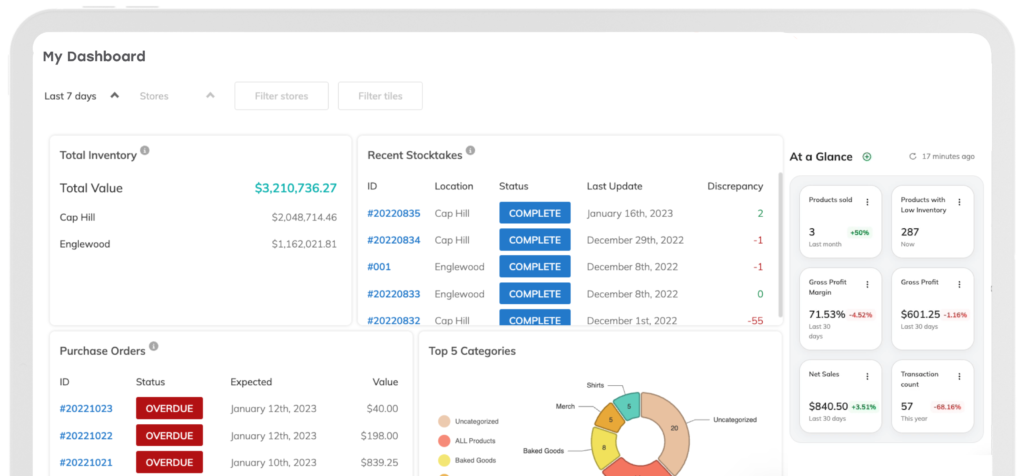
The Ultimate Guide To A Great Company Culture
Ever wondered why some companies can keep employees around for ages while others’ turnover rates outpace their hiring? Sure, the dollar signs on employees’ paychecks are a factor, but their everyday experiences largely contribute to how long they stick around too.
Fostering a positive company culture can help you create an environment where employees are excited to show up every day. In this article, you’ll learn all about building a great retail company culture that helps your employees do – and be – their best.
What Is Company Culture?
Company culture refers to the attitudes, behaviors, and beliefs of a company’s employees, managers, and leaders. It both shapes and is the result of a business’s day-to-day operations and how employees and shoppers feel while interacting with the company. It includes operational elements such as brand messaging, company values, customer service policies, and the business’s mission statement. A positive workplace culture at a small company and a large business alike may be shaped by the leadership of a kind business owner, a team that respects work-life balance, and leadership that listens to and acts on employee feedback.
Why Is A Strong Company Culture Important?
The right company culture can benefit your business in many ways, both internally and externally. A Quantum Workplace survey found that 87 percent of employees who are highly engaged at work say their companies have very strong cultures. When employees see managers promoting certain business values, they might consciously or subconsciously follow suit.
A good company culture also gives employees common objectives to work toward. In fact, employees whose values closely align with your company’s are more likely to perform well. A great company culture makes these values apparent so employees can identify with them and further nurture them.
For others outside your company, a strong company culture shows that your business has clear direction and values. It gives them an idea of what they can expect when shopping with your company. It’s also heavily reflected in your business’s customer service. For example, if your produce shop prides itself on transparency, customers know they can trust how you source natural fruits and veggies. A great company culture, whether you work for a small company or a large corporation, can have a significant impact on customers’ positive experiences with your business – and encourage them to come back.

What Are The Components Of A Healthy Company Culture?
1. Clear and open communication
Communication is key to keeping employees connected and aware of the company’s expectations. Open and clear communication sets clear standards for how employees should be performing and shows them the value they bring to your company. It also makes employees feel like they can approach you and other managers with questions, concerns, and feedback requests.
2. Teamwork
Companies are full of people who each contribute to your organization in some way. That includes the baker mixing ingredients for the day’s sweets, the cashier making light conversations with customers, and the CEO in the back office. The more your company fosters collaboration among these people through a strong workplace culture, the better your team’s working relationships can be.
You’ll likely see the effects of your strong company culture pretty quickly. The more your business encourages teamwork, the more your cashier will gladly jump in to help the baker move a large donut tray between shelves. This can create a positive feeling of unity among your team members.
3. Respect
Conflict is a regular part of everyday life, and it occurs in even the healthiest work environments. It’s how people handle that conflict that makes all the difference. A company culture that prioritizes respect can help you reshape conflict into opportunities for growth and new ideas.
A company that values respect enforces it among employees and leadership. Your leadership should exemplify respect in all interactions, including the relationship between managers and how managers interact with other employees. With a core of respect in your company, your team knows they can have disagreements, but their priority will be to respect each other throughout.

4. Trust among employees
Trust is a sign that your employees can rely on each other. When employees work independently, you signal to them that you trust them. That’s huge – no employee wants to feel like you’re holding their hand all day or checking on them every chance you get.
For example, if an employee is struggling to complete a project or needs feedback on some ideas, she can trust that her colleague will help her and provide honest answers. A high level of trust within your company helps employees work together, encouraging motivation, engagement, and productivity at every level.
Employees whose company culture prioritizes trust are more likely to feel like they belong on the team, and that’s only good news for their work. It also feeds into healthy communication, as team members can freely ask for help and share ideas.
5. Effective decision-making
Your leadership team shouldn’t be the only people making decisions. A positive company culture encourages employees at all levels – not just those at the top – to make the best decisions for their work.
Many great business culture ideas hinge on giving your team the tools they need to make good decisions and letting them do the rest. Trusting your employees’ decision-making shows that you value their approaches and trust them to make the right call. That’s much healthier than micromanaging or “helicopter bossing” your team.
6. Individual goal-setting
Let your employees lead the goal-setting conversation. This can encourage team members to be more accountable for their personal development. Researchers have found that employees who set goals for themselves are typically more proactive.
These team members often have a clearer path for how they’ll achieve growth, and that can give them more motivation. Plus, setting their own goals allows them to grow however they feel is best, giving them a greater sense of autonomy.
7. Employee engagement
Engagement is a clear indicator of how excited your team is to be a part of your company and do their work. Employees who are highly engaged are working for much more than just a paycheck. They enjoy the value, growth, and social and professional connections their work brings.
A team full of engaged employees benefits you too. How great does it feel to be around other people who truly enjoy their company and the work they do? This is why your company’s culture is closely intertwined with your employee engagement.
8. Transparency between managers and employees
Transparency can create a working environment where employees, leaders, and managers are all connected. It contributes to trust, employee morale, and positive performance. With a high level of transparency in place, new employees can feel comfortable coming into your office and asking a question. They’ll know they can get the answers they need with no smokescreens.

How To Create A Strong Company Culture
Set attainable, actionable goals
Fostering a great small company culture doesn’t happen by accident. It’s guided and deliberate. Setting specific goals can give you actionable ways to improve your company’s culture.
Skip over vague ideas and dive into detailed approaches that will help take your company in the right direction. Simply saying “we value trust and transparency” doesn’t actually roll those business values into your company’s everyday operations. Instead, implementing actual practices into your everyday operations — and setting the tone as the business owner — can help your goals become central to your business.
Goal-oriented small business culture examples include focusing on employee collaboration and improving communication. To do this, you might decide to host a team get-together every other month. This way, your employees can build relationships with each other.
To increase trust and transparency, you might implement an open-door policy and emphasize that you welcome any respectful questions. With these practices in place, you’ve set up realistic ways to achieve your goals and establish a healthy company culture.

Define measurable outcomes
How do you know when you’ve reached a goal? Having ambiguous milestones leaves plenty of room for guessing how far your company has really come. On the other hand, clear ways of measuring progress can show you and your team surefire indicators of success. For example, the number of positive reviews your employees solicited from customers and employees’ participation levels at company employee events put numbers to your team’s engagement.
Key performance indicators can help you assess your team and business’s progress across multiple areas. For example, elements such as absenteeism, turnover, and job referral rates are closely related to your company culture. Looking at these values can give you a clear picture of how much progress your business has made.
You can also facilitate monthly employee surveys that ask for your team’s feedback on each of the above culture components. How comfortable do they feel talking to you and other managers about work-related issues? Do they feel that their colleagues support them at work?
Since employee outlook is a large part of company culture, getting their opinions can help you gauge your business’s progress. It also helps you stay accountable to your teams and vice versa. When you’ve heard their feedback, you have no excuse not to act. When you regularly ask for feedback, your team members have no excuse not to engage.
Establish the values at the heart of your company culture
Your personal goals and business values might include providing for your family, giving opportunities to your employees, and contributing to your community. Maybe that means you plan to open additional locations and begin franchising, or maybe you want to sell the business as a retirement nest egg. All these goals and ways of getting there share something in common: They give you a reason to be here.
Helping your employees see similar value can help them feel more invested in your company. Nothing is more damaging to a company’s culture than a mentality of, “I’m just here because I need the money.” Yes, that absolutely can be part of the equation, and fair pay is important, but it shouldn’t be the whole mentality. Every job should encourage employees to find space for growth, experimentation, challenges, and even fun!
Tell your team about the direction in which you want to take your business. Explain that a great work culture can help them grow individually and make their professional experience infinitely better. Emphasizing the importance of taking your business in this direction can help employees get on board and feel motivated to contribute to your efforts.
It’s your job as a manager to engage and better your employees. For example, if you’re working with employees who currently lack hard skills, that means you’re likely providing a stepping stone. You should work with these employees to cultivate a sense of duty and responsibility.

Prioritize communication
Coworkers that communicate well have a much higher chance of collaborating effectively. That starts with encouraging coworkers to get to know each other. Holding occasional meetings, leadership training outings, and company-hosted celebrations can bring everyone together for collective brainstorming and idea-sharing.
You should also work to keep lines of communication open among employees, managers, and leaders. Encourage your employees to communicate with any manager, not just their direct supervisor. The more your employees are connected, the more your great company culture can permeate every corner of your team.
Invest in team-building
A strong team is one built on great relationships and moving forward in a unified manner. That starts with taking the time to learn about your employees’ individual work styles. How can you structure your team in a way where one member’s strengths complement another’s weaknesses? That’s the start of a strong team.
You should also ensure that everyone knows their tasks and responsibilities. This way, team members don’t clash as they try to do their jobs. You should create spaces for them to share respectful feedback with their peers. From there, you can figure out how to better organize your employees and help everyone work better together. That’s a near-certain path to a great company culture.
A key component of building a strong team is being open to suggestions, questions, and criticism. This shows all your hires that everyone is on the same playing field. Employees want to know they can talk about their concerns instead of having to internalize them and hoping they’ll eventually get resolved. Being approachable tells your team you care about their feedback and want to use it to benefit both them and your business. The result is a strong company culture where employees know they can be transparent about their concerns.
Hire the right people
As the company grows, you’ll need to bring new people into your small business. As you and your existing employees build a healthy small company culture, you’ll need to be sure new hires will positively contribute to the team. That’s where the notion of a “culture fit” plays into the hiring process. Prioritize hiring people who are on the same page as you and who share the same core values.
It’s also important to center diversity and inclusion (D&I) best practices in your hiring process. Diversity in the workplace brings fresh perspectives to your company, bolstering creativity and encouraging new ideas. With new ways to problem-solve in the mix, you continue to develop a supportive company culture that’s open to changing the way things are done.
Job candidates will likely look at your company’s culture to see if it’s a good fit for them too. You should consider how well their personality, work ethic, and goals align with your company culture. Share your company’s missing during the interview and let them know up-front how you value an inclusive culture that encourages collaboration, communication, and support.

Offer incentives that show your appreciation
Offering incentives can be a great way to increase motivation among your employees. They show that you recognize and value all the hard work your team is putting in to move your business forward.
Company culture incentives can lead to higher employee engagement as you reward employees for doing their best work. Of course, incentives alone can’t create a great company culture – a toxic work environment can hollow out any incentive – but they’re a start.
Your incentives should go far beyond free snacks in the breakroom. They could include discounts, extra vacation time, team outings, and even an all-expenses-paid trip if you’re thinking big. No matter how big or small the prize, showing employees you appreciate their efforts can increase their motivation, sense of belonging, and overall morale. It also puts you in a place to make more improvements to your company culture.
Formalize your company culture in a handbook
After setting your goals for a great company culture and deciding how you’ll make it happen, it’s time to put them in one place. Assembling a handbook not only puts your plans in writing, but it makes them accessible to all company-wide. Once your handbook is ready, email a copy to all employees with a quick note explaining what the document is and the role it plays in your business.
A Positive Environment For Everyone
Being intentional about creating a positive work environment involves bringing employees together, sparking their motivation, and creating an all-around great place to work. Encouraging the development of key values such as communication, trust, and transparency helps foster this kind of workplace. It’s how you get employees excited to work – and give customers something to remember.
The Newsletter For Small Businesses
Weekly expert insights, industry trends, and inspiring stories designed to help you run your business with confidence.
The Only Inventory System That Actually Helps You Run A Healthy Business
Thousands of customers all over the world use Thrive Inventory to run a healthy business.
Thrive Inventory gives you control over all your inventory, sales channels, and metrics, allowing you to make the right decisions at the right time.
Keep Reading

The Newsletter For Small Businesses
Weekly expert insights, industry trends, and inspiring stories designed to help you run your business with confidence.
Try Thrive Inventory For Free
Add Thrive Inventory to your business and maximize your potential. With powerful and easy-to-use products, it’s time to take control of
your business and see what you can do with Thrive.




